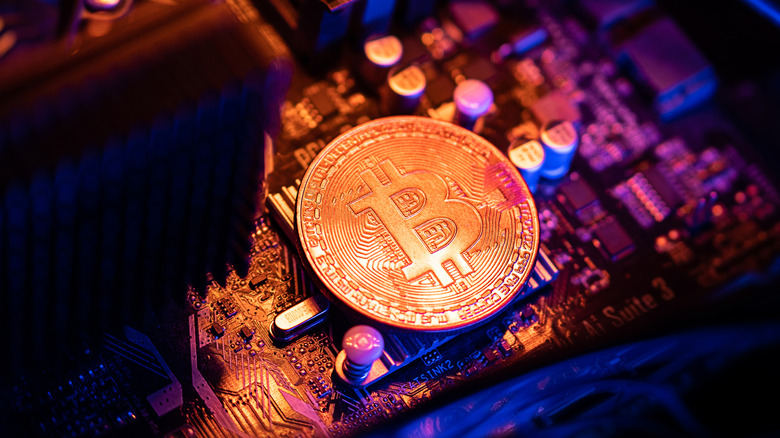Whatever Happened To The Bitcoin Pizza Guy?
The Bitcoin market is witnessing an epic meltdown right now, as its value has tumbled from a peak of over $60,000 to less than half of that in just over six months. Reddit threads are buzzing with chatter over the future of Bitcoin, while Twitter is busy roasting crypto evangelists over the crash. But there's hardly any name that symbolizes Bitcoin-related loss more than Laszlo Hanyecz, a programmer and early Bitcoin miner better known as "the Bitcoin pizza guy" who spent 10,000 bitcoin on a couple of Papa John's cheese-loaded calorie bomb delicacies.
Hanyecz posted on the official Bitcoin talk forum back in the year 2010 that he would trade 10,000 Bitcoins for pizza. After floating the offer and four days of disheartening delay, Hanyecz shared that he had succeeded in his endeavor. Hanyecz got two Papa John's pizza boxes on that fateful day in exchange for 10,000 bitcoin, and the transaction came to be known as the world's first commercial purchase made using cryptocurrency. That remarkable achievement is now celebrated every May 22 as "Bitcoin Pizza Day." But Hanyecz was not the only one to seemingly squander the fortune. On the other end of the infamous pizza deal was Jeremy Sturdivant, a product development engineer who spent those Bitcoins for traveling.
The other Bitcoin pizza guy
Sturdivant, who was simply referred to as the alias "jercos" on the BitcoinTalk community forum, was a 19-year-old student when he came across the unusual request. Sturdivant himself doesn't appear on the forum chat, but he told Bitcoin Who's Who that the conversation with Hanyecz happened on Internet Relay Chat (IRC). He added that the bitcoin he received in exchange for the delivery of two pizzas was later used to finance his U.S. travel plans.
"It seemed fair for both parties, low-risk, and well, who doesn't like some kind of pizza?" Sturdivant was quoted as saying. In his own words, Sturdivant's Bitcoin holdings also helped him buy games apart from supporting his travels. More importantly, he claims that he has no regrets over the turn of events and that he was content with the fact he inadvertently played a pioneering role in our collective history.
The one who ate the golden pizza
At the same time, Sturdivant modestly noted that he "can't claim any responsibility for bitcoin's success." And despite the ills associated with Bitcoin, and cryptocurrencies in general, Sturdivant said he believed the cryptocurrency would one day be a positive force for our global society, "empowering individuals and companies alike to handle local and international trade in a fair and traceable manner, and that's exactly what I see it bringing to the future, as a component in an era of economic freedom."
Unfortunately, the 2018 interview is also where Sturdivant's trail of mainstream interactions ends. He doesn't appear to have a verifiable social media account which makes it almost impossible to check on his current whereabouts or on what he's been up to over the last several years.
Just like Sturdivant, Haynecz had also faded into obscurity from the public view on the internet, but his name pops up almost religiously every year around Bitcoin Pizza Day. His last interaction with a reliable outlet was an interview with CoinDesk, which mentioned that he was employed by a company named GORUCK that makes rucking gear and also happens to accept bitcoin as a form of payment. But Hanyecz is more than just another bloke who threw away a fortune worth hundreds of millions of dollars worth of cryptocurrency. In fact, he was one of the earliest adopters of Bitcoin and is credited with devising the system for mining cryptocurrency using the added firepower of a computer's GPU.
Bitcoin Pizza Guy and the world's GPU shortage
As history would have it, Hanyecz may be partly responsible for the crunch in the GPU market and sky-high prices because cryptocurrency miners continue to rely on graphics cards to process cryptocurrency of all sorts. In fact, Hanyecz reportedly exchanged notes about the underlying software and bugs with none other Bitcoin's enigmatic creator Satoshi Nakamoto. In his book Digital Gold, author Nathaniel Popper shared an email that was allegedly written by Satoshi and addressed to Hanyecz, in which the former expressed displeasure over creating a GPU-fueled system for mining Bitcoins.
Satoshi was of the opinion that a GPU-powered system gives an unfair advantage to people who can afford expensive graphics cards. Hanyecz appears to have a Twitter account where he is soliciting Bitcoin donations now that he's "poor," but the last tweet from the account is dated 2018. One can argue that Hanyecz's innovation has added to the woes of gamers across the world, who must now pay a significant premium for new graphics cards as they join the fight for purchase with cryptocurrency miners and scalpers alike.
Past and future
Based on Bitcoin's market cap as of May 16, 2022, Hanyecz's pizza cost him over $300 million. But at peak of Bitcoin's market value in November of 2021 as per CoinDesk data, he forked over $670 millon on his pizza treat. Assuming the real price of the two pizzas was $40 back then, Hanyecz paid 1,688,8250 times more for the delicacy than what an average guy would've paid in 2010 using fiat currency.
The cruel turn of events is enough to give life-long trauma to any sane human being, and Hanyecz is no different. When asked about the toll it took on him during the popular 60 Minutes interview with Anderson Cooper, Hanyecz remarked that reminiscing about losing hundreds of millions over pizzas was "not really good" for him. There's also a dedicated Twitter account called Bitcoin Pizza that has been updating the current price of the pizzas ordered by Hanyecz based on the latest Bitcoin-to-USD conversion rate.
However, the last few weeks have been nothing short of a bloodbath in the cryptoverse. Since November, the crypto market has lost over one trillion dollars, with Bitcoin and Ethereum taking the biggest hits by scale. The debate over the legitimacy and future of cryptocurrency in general, however, is still as hot as it ever was. On one hand, countries like El Salvador and the Central African Republic have embraced Bitcoin, but the rest are still skeptical about the cryptocurrency's utility given its extremely volatile nature and how it serves as an avenue for financial crimes.




